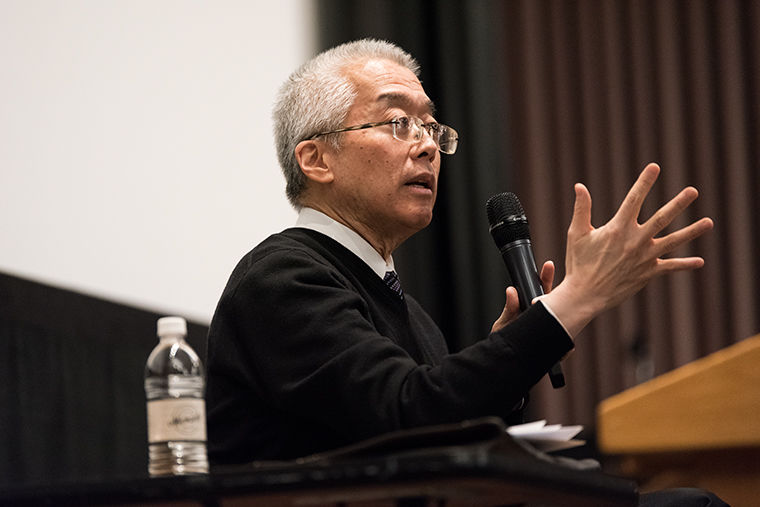Kim: We have to rethink this together
February 12, 2018
In a packed room filled with faculty, staff and administration, President and CEO Kwang-Wu Kim detailed his vision for the college’s future, addressed ongoing concerns and gave updates on the college’s progress on Strategic Plan implementation.
Kim began the event, held Feb. 7 at 1104 S. Wabash Ave., by acknowledging that he has not been as present at the college recently, but he thought it was time to engage faculty and staff about the college’s current standing.
“I believe we’re all here, not just in this room, but in this institution because we share a common belief in the value and importance of Columbia College Chicago,” Kim said during the event.
While discussing the college’s changes in enrollment between its historically low current numbers and its 2008 peak, Kim said the college would not benefit from returning to its past ways of thinking, including open enrollment. Despite the popularity of open enrollment among college faculty, Kim said it previously put the college at a disadvantage because admitted students included those who would not succeed.
“We would bring in students regardless of their ability to pay or succeed, and when they inevitably failed, there was always a new student to take their place,” Kim said. “I would question all of us, starting with myself, is that a model that we would want to be proud of or want to return to? Knowing this college the way I do, I’m willing to say, ‘No chance.’ No chance would we want to stake our claim as an institution on what is essentially a practice which is questionable from an ethical and moral perspective.”
Kim added that data unfortunately predicts a continuous nationwide enrollment decline for the next 15–20 years, but Senior Vice President and Provost Stan Wearden is analyzing data and communicating with faculty to determine the best students to admit to help stabilize enrollment.
“This is something we needed for a long time because, unless we’re very intentional about which students we’re trying to recruit and why we’re not going to change the enrollment situation,” Kim said.
Kim added that the college’s enrollment declines are not the problem, but a symptom of Columbia not clearly stating the value of its education.
“All the work that all of you are doing is, in fact, geared toward getting clarity about that value,” Kim said. “We have to rethink this together because we’re not moving quickly enough. The model of change we are currently trying to implement has too many strands, too many pieces that don’t feel connected, too bound by the way we think about ourselves as an institution of higher education and as a result, we’re not keeping pace.”
Kim also proposed the idea of a faculty space for collaboration, interdisciplinary work and imagining future work, which he said is not possible if the college continues traditional ways of thinking.
“This is about excellence, innovation [and] true entrepreneurship, which moves fast, as opposed to how we like to move, which is very deliberately,” Kim said. “It’s got to be a space where at least as many mistakes are made as successes developed.”
In response to this proposal, Eric May, associate professor in the English and Creative Writing Department, said faculty need more time to properly collaborate, with which Kim agreed.
May added that whenever faculty asks for extra time during the academic year to work together, they are turned down.
“We have to remember one of the most important resources is time,” May said. “We’re not going to get where we need to be in an interdisciplinary way if the college will not give us the time, but that’s probably the most important commodity.”
Senior interactive arts and media major Dane Wheaton stood out from faculty during the event to advocate for more departmental authority and less at the dean level from a student perspective, describing the current circumstances as an “administrative stranglehold.”
“Centralizing the decisions may be hurting more than it’s helping,” Wheaton said. “We find ourselves going on wild goose chases whenever we’re looking for information. We’re bearing a disproportionate amount of the financial impositions and curricular changes I don’t think are necessary. We can do a whole lot better if the departments themselves are given a lot more freedom.”
Kim agreed with Wheaton, echoing his earlier statements on the importance of rethinking the college’s processes to be more effective.
“We haven’t come to a determination of what that adjustment means but you’re right,” Kim said. “We’re exactly at the moment when we have to rethink.”








